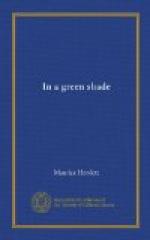My point, however, is that, if we are to have a Labour Government, it must be a Government of a nation, and not a class-affair. When the Duke said that the King’s Government must be carried on, he meant the Government of King George or King William. Our present Prime Minister means the Government of Mr. George, which is a very different affair. In its way of simple egotism it is precisely the meaning of the trade unions, and can be shortlier put as “After me the deluge.” And that won’t do. We want neither autocracy nor anarchy; and just now the one involves the other.
A COMMENTARY UPON BUTLER
Mr. Festing Jones has written a large book about his friend, and written it very well.[A] It is candid, and it is sincere; the work of a lover at once of Butler and of truth; it neither extenuates the faults nor magnifies the virtues of its subject so far as the author could perceive them; and it makes it possible to understand why Butler was so underrated in his lifetime, though not at once why he was so overrated after his death. That remains a problem which cannot be resolved by saying that his friends trumpeted him into it, or that posthumous readers enjoyed seeing him belabour his betters, which his contemporaries had not. It is true that The Way of All Flesh did not appear until he was dead, and also true that The Way of All Flesh is a witty and malicious novel, whose malice and wit Mr. Shaw had prepared London to admire. Perhaps it is true, once more, that we are more scornful of the old orthodoxy than our fathers were, and less careful whose feelings are hurt. But I must confess that I should not have expected any age to be so complacent about caricaturing one’s father and mother as our own was. However, for those who admire that sort of thing—and there must be many—I doubt if they will find it better done anywhere, with more gusto or more point. Dickens is believed to have put his father into David Copperfield, not, I think, his mother. But one can love Mr. Micawber, and Dickens would not have so drawn him without love. We are led to Butler’s favourite distinction between gnosis and agape. There’s no doubt about the gnosis that went to the making of Theobald and Christina. But where was agape?
[Footnote A: Samuel Butler, Author of “Erewhon" (1835-1902): a Memoir. By Henry Festing Jones. Two Vols. Macmillan, 1919.]
Butler was in many respects a fortunate man, and should have been a happy one. He had a good education, good health, a sufficiency of means. Even when his embarrassments were at their heaviest he could always afford to do as he pleased. He could draw a little, play a little, write more than a little; he loved travel, and covered all Southern Europe in his time; he had good friends, a good mistress, a faithful servant; he had a strong sense of humour, feared nobody, had a hundred interests. Why, then, did he think himself a failure? Why was the sense of it to cloud much of his writing, and much of Mr. Jones’s biography?




